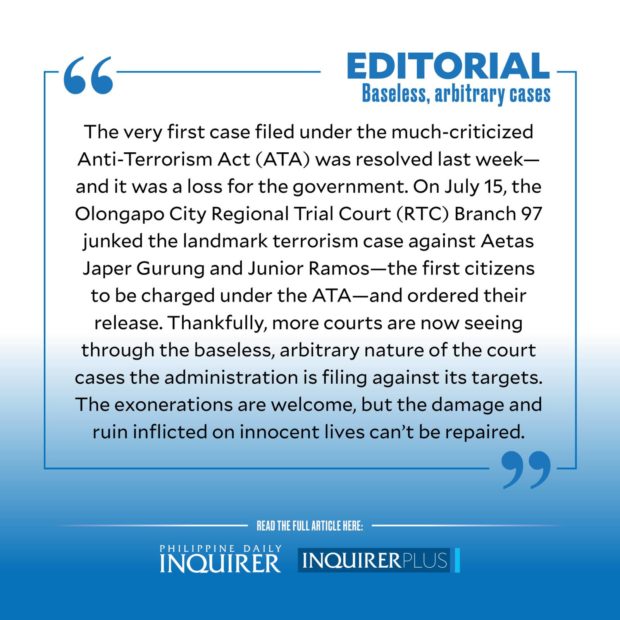Baseless, arbitrary cases
 The very first case filed under the much-criticized Anti-Terrorism Act (ATA) was resolved last week—and it was a loss for the government. On July 15, the Olongapo City Regional Trial Court (RTC) Branch 97 junked the landmark terrorism case against Aetas Japer Gurung and Junior Ramos—the first citizens to be charged under the ATA—and ordered their release.
The very first case filed under the much-criticized Anti-Terrorism Act (ATA) was resolved last week—and it was a loss for the government. On July 15, the Olongapo City Regional Trial Court (RTC) Branch 97 junked the landmark terrorism case against Aetas Japer Gurung and Junior Ramos—the first citizens to be charged under the ATA—and ordered their release.
The two Aetas were accused of being communist rebels who allegedly fired on government troops in August last year, but the court noted “blatant” inconsistencies in the statements of soldier-witnesses that it said failed to prove the two Aetas’ identities and their involvement in that encounter: “The inconsistencies of the soldiers on the presence of the accused at the crime scene and the profiling of the accused, and the presence of the danger signal in their identification of the accused cast doubt on their testimonies that accused were the perpetrators of the crime.”
The court also ruled that the two were illegally arrested without a warrant. As a result, the search conducted on them was invalid and the evidence allegedly seized—firearms and weapons—were considered inadmissible.
The two Aetas described themselves as lowly farmers tilling their small farms in Zambales when a firefight on Aug. 21, 2020 had them fleeing their homes with their families for a nearby evacuation center. But soldiers stopped them, supposedly for their safety, only to arrest them for allegedly being members of the communist New People’s Army (NPA) who were trying to escape.
The Aetas said they were tortured in detention to force them to admit to being NPA rebels. “Gurung was asphyxiated with cigarette smoke while a plastic bag was placed over his head, placed inside a sack and hung upside down, and ordered to eat his own feces,” read the petition prepared by the National Union of Peoples’ Lawyers (NUPL) on their behalf. After six days, the two were charged with illegal possession of firearms and violating the ATA.
Citing the two men’s arrest and subsequent torture, the NUPL, the original counsel of the Aetas and among the 37 petitioners challenging the legality of the ATA in the Supreme Court, accused the government of abuse in implementing the controversial law.
Just days before the Aetas’ case dismissal, four members of another indigenous group similarly tagged as communist rebels were ordered released by a Capiz court. On July 13, the court voided five search warrants against members the Tumandok community who were arrested in December 2020 in a police crackdown on activists and community organizers. Nine Tumandok members died during the raid for allegedly resisting arrest—the same narrative used to justify the Bloody Sunday killings of nine red-tagged activists in Southern Luzon on March 7, 2021.
In two separate resolutions, Capiz judge Rommel Leonor quashed the search warrants because “they did not satisfy the constitutional requirement of definiteness or particularity,” in that there were no “specific or particular description[s] of the place and things to be searched or seized.” This was the third time that search warrants issued by Metro Manila RTCs and deployed by the military and police against suspects in other areas have been invalidated. Leonor also barred all pieces of evidence obtained in the “illegal search.”
The defective documents, described as virtual “death warrants” by activists and lawyers, prompted the Supreme Court in a June 29 resolution to scrap a 17-year-old rule that allowed executive judges of Manila and Quezon City regional trial courts to issue search warrants outside their judicial regions.
The half-baked and flimsy evidence used to justify the arrest of the two Aetas and the unconstitutional warrants served on members of the Tumandok tribe once more underscore how the ATA and other laws are being weaponized to cow and harass citizens perceived as enemies by the government. Critics have singled out the ATA’s vague provisions that provide blanket cover for authorities to accuse persons of “terrorist acts.” In their manifestation, former magistrates Antonio Carpio and Conchita Carpio Morales pointed to the threat of arrest for “aiding terrorists” issued last February by now resigned anti-insurgency spokesperson Army Lt. Gen. Antonio Parlade Jr. against Inquirer.net reporter Tetch Torres-Tupas.
Tupas’ “crime”? Writing about the Aetas’ case. “The obvious invasion of protected expressive rights is possible only because the language of the anti-terrorism law] is vague and overbroad, casting a wide net of possibilities,” warned the two ex-jurists.
Thankfully, more courts are now seeing through the baseless, arbitrary nature of the court cases the administration is filing against its targets. The exonerations are welcome, but the damage and ruin inflicted on innocent lives can’t be repaired.



















